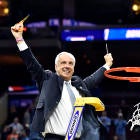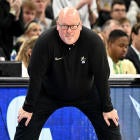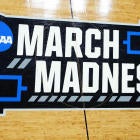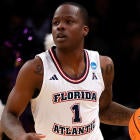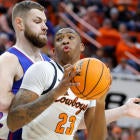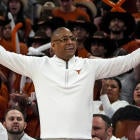So let me get this straight: At the same time that the NCAA (with the help of the FBI) is doubling down on the purity of amateurism, the organization is now abdicating its role in policing academic matters.
Wait, what?
What is the euphemism "student-athlete" even worth any more, other than for a knowing chuckle in the highest, most lucrative tier of college athletics?
On Friday morning -- 17 days after the college basketball world was shaken to its core with the arrest of 10 people involved in the sport, including top-tier assistant coaches and shoe-company executives -- the NCAA washed its hands of an investigation into academic misconduct within the University of North Carolina athletic department that began seven years ago. Instead of coming down with the hammer, taking down banners and reinforcing that there is still some holiness left in this unholy marriage between academics and athletics, the NCAA said, basically, "Nothing to see here, folks. Move along."
The dichotomy of these two simultaneous cases -- the UNC case and the FBI case -- is stunning.
For nearly two decades, UNC had, according to a university investigation, offered a "shadow curriculum" of so-called "paper classes." These classes, nearly 200 in total, required no attendance and only one paper. Some 3,100 students attended these paper classes, with some 1,500 student-athletes -- ahem, "student-athletes" -- being steered into these classes.
But because these sham classes in the African and Afro-American Studies Department were also open to non-athletes -- and since, yes, slightly more non-athletes took (ahem: "took") these classes than athletes -- the NCAA said this was an academic matter, not an athletic matter. After an interminable investigation, the NCAA determined this was outside of its limited jurisdiction.
Instead of taking a moral stand and risking legal action by UNC, the NCAA agreed with UNC's rebuttal to the NCAA's original charges.
"Based on the nature of the case and the posture of the record, the panel concludes that the only violations in this case are the department chair's and the secretary's failure to cooperate," according to the NCAA public infractions decision. "The infractions process requires the cooperation of all individuals with pertinent information. Here, both were key figures at the center of UNC's academic shortcomings. While others had suspicions, or knew something was occurring in the department, only they knew the true nature of the courses. Both initially refused to cooperate. The department chair never cooperated."
So the NCAA slapped Julius Nyang'Oro, the former head of an academic department at UNC, with a five-year show-cause penalty. I guess that means his coaching career, which had never begun, is now over.
And, other than a bit of egg on UNC's face, that's pretty much it.
It is true that the NCAA, as a member institution that relies on the cooperation of its members in its punishment process, is severely limited by its own rulebook. That is why NCAA punishments so often are meted out about the cover up as much as the crime; lying to the NCAA is something the NCAA knows it can reliably punish, even if they can't go after the rule violation at the core of a case. But the fact that UNC was let off on a ridiculous technicality -- As long as these fake classes are offered to athletes and non-athletes, we can't do anything about it! -- does not excuse the lack of moral responsibility here.
Then, as if the NCAA were purposefully trying to underscore its total relinquishment of its supposed mission of marrying academics and athletics, the organization followed up its UNC non-punishment by also announcing Friday that North Carolina State freshman guard Braxton Beverly was ineligible to play this season. Why was he ineligible? Folks, you cannot make this stuff up: He is ineligible because he attended class.
You read that correctly. On the same morning it told UNC that the fact 1,500 athletes attending fake classes didn't really matter -- or at least it couldn't be dealt with under the its rulebook -- the NCAA also told Beverly that, because he attended a few classes at Ohio State this spring and then transferred to N.C. State, he couldn't play basketball this year. And that's despite Beverly's coach at Ohio State, Thad Matta, getting fired weeks after Beverly started his classes.
It's the same old story here: The institution survives. The "student-athlete" suffers.
The backdrop of Friday's UNC decision is important. The past few weeks have seen all sorts of self-righteous chest-puffery in college sports about how this FBI investigation, which will only widen in coming months and years, will finally clean up college sports. There are two parts to the FBI investigation. I am not going to focus on the part about the four assistant coaches who were profiting off directing "their" players to shady agents, financial advisors and businessmen. The FBI referred to this practice as "pimping" these NBA prospects. This is despicable. Every college coach I've spoken with the past few weeks has agreed that this practice is inexcusable, a cancer that needs to be excised from this sport.
In the light of Friday's UNC decision, however, what I want to focus on is the other part of the FBI corruption investigation. The FBI has said that shoe companies -- specifically Adidas, but if you think this investigation starts and stops with Adidas, you're insane -- have been offering money to players to attend partner schools. The $100,000 Adidas funneled to five-star recruit Brian Bowen's family is what sent Louisville head coach Rick Pitino out the door. This is what passes for corruption in college basketball. Sham classes, apparently, do not.
The FBI called this shoe company scheme "bribery." But you could easily reframe it as something else. Like, say, "sponsorship." Or, you know, "getting your fair market value in a capitalistic society." The $100,000 Adidas gave Bowen helped fill the gap between his value to the school and the amount of money the school is allowed to pay him.
Stick with me here, folks. We're getting to the nut of this massive hypocrisy.
The NCAA created this black market where players feel compelled to take this sort of money.
It can correct it, too.
What backers of amateur collegiate athletics have always argued is that these "student-athletes" are getting paid in different ways: in media exposure, in the elite training and coaching they get, with minimal cost-of-attendance stipends schools are permitted to give these athletes, but most of all, with a quality college education.
A quality college education does not include paper classes.
The day before the NCAA released its decision on the UNC academic scandal, Pac-12 commissioner Larry Scott told reporters that the FBI investigation and the surrounding scandal buttressed his belief in amateurism. "We do not want students-athletes coming to our schools to earn a living," Scott said.
I wasn't in San Francisco during the Pac-12's media day, but I'm pretty sure Scott did not break into hysterical laughter after uttering that indefensible defense of this broken amateurism model.
But I can report that in 2014, Scott became the first conference commissioner in "amateur" sports to make more than $4 million a year.
My message to the power brokers of big-money amateur collegiate sports is this: You can no longer have it both ways, as you have for so many decades. You cannot let North Carolina off on essentially a technicality -- Not in our rulebook, don't want to go to court! -- while at the same time punishing individual student-athletes on far less important technicalities. (Beverly this year, so many others in years past.) You cannot continue to rake in millions from shoe companies and television contracts and then deny the players in getting at least a fraction of that pie. You cannot claim these "student-athletes" get paid with a college education and then at the same time let the devaluation of those college educations (with, say, paper classes) go unpunished.
One solution is, quite simply, to allow players who bring millions to their schools to get some of that money. Follow the Olympic model. Allow sponsorships for individual players. Take Adidas' supposed corruption and make it something that's above board and can be done out in the open.
After that is done, and only after that is done, can you tackle the more disturbing parts of collegiate athletics: the exploitation of players, the devaluation of a collegiate education through paper classes like UNC's or sham online classes like many other schools, the NCAA's focus on picayune rulebook violations instead of the big-picture moral questions like this UNC academic scandal.
You cannot have the purity of amateurism and the riches that come with big-money sports.
It's time to pick one.
Get the latest on this developing story from insiders on the ground at Chapel Hill. They've been covering Carolina athletics for two decades and will have all of the fallout, including recruiting impact and what's coming next. Visit InsideCarolina.com right now.













